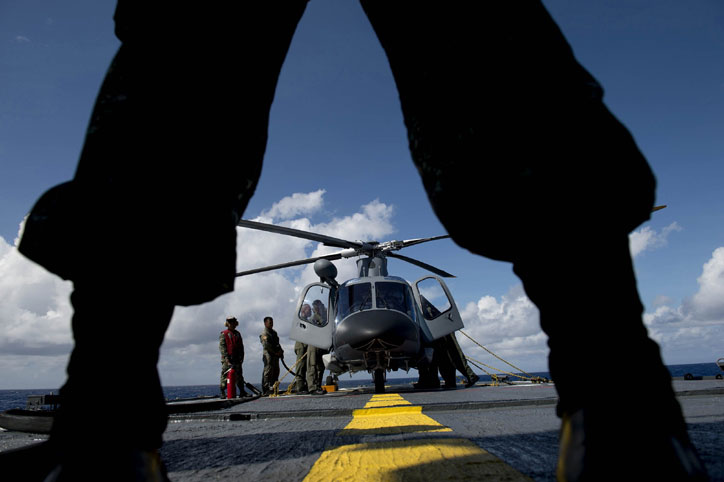 The
The ruling by the Permanent Court of Arbitration (PCA) in The Hague on the South China Sea dispute in favour of the Philippines may have come as a setback for China but it will not stop Beijing from continuing with its quest for maritime hegemony in the region.
"The reaction of China on the court's ruling was on expected lines," Prashant Kumar Singh, Associate Fellow in the East Asia Centre of the Institute for Defence Studies and Analyses (IDSA), said.
"In the immediate term, it might adopt aggressive posturing and show a defiant face to other claimants to the dispute and also to the US which is a security provider for many of the claimants, including the Philippines," he said.
But in the medium term, he said, how things would play out would depend a lot on domestic, international and regional responses to the situation.
An international arbitration tribunal in the PCA ruled on July 12 that China violated the Philippines' rights in the South China Sea, one of the busiest commercial shipping routes in the world.
The court accused China of interfering with the Philippines' fishing and petroleum exploration, building artificial islands in the waters and failing to prevent Chinese fishermen from fishing in the zone.
The tribunal held that fishermen from the Philippines had traditional fishing rights in Scarborough Shoal in the South China Sea and that China had interfered with these rights by restricting their access.
The court held that Chinese law enforcement vessels unlawfully created a serious risk of collision when they physically obstructed Philippine vessels in the region.
China is locked in disputes over the Spratly and Paracel groups of islands in the South China Sea with other countries of the region.
While the other claimants over the Spratly islands are Brunei, Malaysia, the Philippines, Taiwan and Vietnam, the Paracel islands are also claimed by Vietnam and Taiwan.
The most heavily contested are the Spratlys, a group of 14 islands, islets and cays and more than 100 reefs that are strategically located.
Abhijit Singh, head of the Marine Security Initiative at the Observer Research Foundation, pointed out that the tribunal has ruled that areas where China claimed for setting up exclusive economic zones (EEZs) could not be called islands as these were rocks and could not sustain life.
"China has made territorial and historical claims," Abhijit Singh said. "But the most important claim is that of sovereignty."
He said that China already has a territorial dispute with Japan over the Senkaku islands in the East China Sea west of Okinawa.
"China regularly keeps sending naval ships in the vicinity of the Senkaku islands," Abhijit Singh said.
China is also jittery about what former President Hu Jintao described as the "Malacca Dilemma".
The Malacca Strait is a narrow stretch of water between Malaysia and the Indonesian island of Sumatra and serves as a crucial link to the South China Sea.
The Chinese are worried that the strait, which is effectively under the US control, can be choked any time if trouble arises, cutting down energy supplies from the Middle East and Africa.
"To overcome this, they are taking steps like building the Gwadar port in Pakistan," Prashant Singh said, adding that China was building ports at Hambantota in Sri Lanka and Djibouti as well.
That China was seeking to increase its dominance in the Indian Ocean region became evident when the Maldives parliament passed a land lease act in undue haste last year.
"It was perceived to be a move to clear legal hurdles for release of land to China," Prashant Singh said.
In fact, the process of shifting China's military strategy from land to the seas and oceans has been underway for some years.
But, the big official endorsement came in the form of the 2015 military strategy paper, according to Prashant Singh.
"The purpose is to protect China's sea lanes and energy supplies from the Middle East, Latin America and other parts of the world," he said.
The second goal, he said, was to protect China's overseas interests like in Africa.
"They cannot protect their overseas interests without having a robust naval strength and presence."
According to foreign policy expert Dhrubajyoti Bhattacharjee, China is trying to further its maritime ambitions under the guise of exploring for rare earth minerals, gold and natural gas through its deep sea submersibles Dayang 1, Jialong, Qianlong and Hailong.
"But the fact of the matter is China only has passive technology for deep sea mining (meaning it has the equipment but it has only been tested overground and not the under the sea)," Bhattacharjee said.
While China virtually holds the monopoly in exports of rare earth minerals, it has reported finds of gold deposits off the east China coast and in southwest Indian Ocean, the exploration contract for which it has got from the International Seabed Authority.
"Only India and South Korea have the active technology for deep sea mining," Bhattacharjee said.
 The ruling by the Permanent Court of Arbitration (PCA) in The Hague on the South China Sea dispute in favour of the Philippines may have come as a setback for China but it will not stop Beijing from continuing with its quest for maritime hegemony in the region.
The ruling by the Permanent Court of Arbitration (PCA) in The Hague on the South China Sea dispute in favour of the Philippines may have come as a setback for China but it will not stop Beijing from continuing with its quest for maritime hegemony in the region.